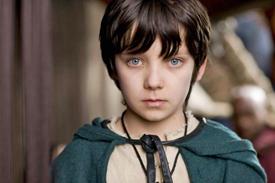
Someone in the Martin Scorsese camp is a big fat liar and odds are it’s the critically lauded director himself. The announcement of his new film Hugo turned more than few heads, as it was both Scorsese’s first movie to feature 3-D technology and his first attempt at a family-friendly children’s movie.
Trailers, hype and looks can be deceiving though, because Hugo is definitely not a children’s movie, even if it was adapted from a children’s book, Brian Selznick’s The Invention of Hugo Cabret. It is not too violent, racy or thematically inappropriate for the young demographic — no, Hugo is just boring, for all ages.
Beautifully shot and wonderfully acted, the movie is too lighthearted to have any urgency, and the subject matter is too dry for its own good. Despite the promise of deeply emotional storytelling set alongside standard children’s story tropes such as automaton-style boys and magic keys, Hugo, to its very core, is Scorsese’s ode to 1920s filmmaking and a plea for the preservation of old films.
Sound like something your 10-year-old would be interested in?
Before I bore you with the details, I should qualify how I can be so sure this movie is not family-friendly. On the way out of the screening I happened to overhear — as sneaky critics do — many little kids complaining about how tedious the film was, and I spied a few parents having to physically carry their sleeping brood out of the theater.
The glacial pace and dry drama of Hugo isn’t just dull for the younger crowd, either. It has its moments, but unless old-school movies are your thing, be aware you might nod off in the middle.
The film’s main mystery is solved in the first half-hour, allowing Scorsese to devote the next hour and a half to his love of early silent cinema. At this point, Georges Méliès (Ben Kingsley, Prince of Persia: The Sands of Time) becomes the focus, as orphans Hugo (Asa Butterfield, Nanny McPhee Returns) and Isabelle (Chloë Grace Moretz, Hick) embark on what can be best described as a “library quest,” with the goal of making Méliès feel better.
That’s the whole film. The movie constantly feels as if it is on the edge of becoming really good, but the plot is so detached that trying to invest in it is more of a chore than anything else.
Still, the film has its fair share of great traits.
The acting — especially from Butterfield and Kingsley, who manage to make some incredibly ham-fisted lines of dialogue seem poignant — is one of the movie’s best aspects.
Hugo‘s cinematography is the real treat — it’s a delight to behold that deftly mixes modern graphics with archaic camera tricks. The scenery is chock-full of practical set designs and believable computer graphics and, as a testament to Scorsese’s ingenuity, the director even makes the much criticized 3-D format look great.
Even if the plot is mostly unexciting, the numerous flashbacks to Méliès’ days as a famous director provide a rewarding behind-the-scenes look at filmmaking days gone by. In reality, however, it’s hard to care about Méliès’ struggles as a well-to-do old man — everyone has their own problems.
If the film had focused more on the plight of its title character then perhaps his own inevitable happiness would be more affecting, but as it is, only Hugo‘s visuals will inspire.
VERDICT: Despite fantastic acting and directing — and some of the best cinematography of the year — Hugo is too slow and boring to ever get off the ground.
berman@umdbk.com



